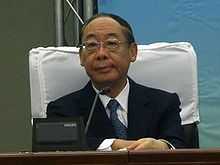Frederick Chien
| Frederick Chien 錢復 | |
|---|---|
 | |
| Frederick Chien during a 2009 press conference for the Deaflympics | |
| President of Control Yuan | |
| In office 1 February 1999 – 1 February 2005 | |
| Preceded by | Wang Tso-yung |
| Succeeded by | Wang Chien-shien |
| Minister of Foreign Affairs of the Republic of China | |
| In office 1 June 1990 – 10 June 1996 | |
| Preceded by | Lien Chan |
| Succeeded by | John Chiang |
| Personal details | |
| Born | 17 February 1935 (age 80) Hangzhou, Chekiang, China |
| Nationality | |
| Political party | |
| Relations | Shu Chien (brother) Chien Shih-Liang (father) Carl Chien (son) |
| Alma mater | National Taiwan University Yale University |
| Profession | Diplomat and politician |
Frederick Chien, or Chien Foo (Chinese: 錢復; pinyin: Qián Fù; born 17 February 1935), was the Minister of Foreign Affairs of the Republic of China on Taiwan from 1990 to 1996.[1]
Background
Chien is known as one of the "four princes of Taiwan" along with Chen Li-an, Lien Chan, and Shen Chun-shan, all of whose fathers attained prominence in politics prior to their sons' successes.[2] He attended National Taiwan University as an undergraduate, graduating in 1956. He went on to Yale University in New Haven, Connecticut, where he earned his M.A. (1959) and Ph.D. (1962) in international relations.[1] He wrote his thesis on Qing Dynasty China's diplomacy in Joseon Dynasty Korea during the opening of Korea, focusing on the period between the Japan-Korea Treaty of 1876 until the 1885 Convention of Tientsin.[3]
Works
- Chien, Frederick Foo (1967), The opening of Korea; a study of Chinese diplomacy, 1876-1885, Connecticut: Shoestring Press, OCLC 953610
- Chien, Frederick (1996), "Pragmatic Diplomat: The Principles of Taiwanese Foreign Policy", Harvard International Review 19 (1), ISSN 0739-1854, OCLC 91933623
- 錢復 (2005), 《錢復回憶錄》 (Qian Fu Huiyi Lu = Memoirs of Frederick Chien), 天下遠見出版股份有限公司, ISBN 978-986-417-416-4, OCLC 58650808. In two volumes (ISBN 9789864174171, ISBN 978-986-417-418-8).
See also
| Wikimedia Commons has media related to Frederick Chien. |
References
- ↑ 1.0 1.1 《中華民國監察院院長錢復先生》 [Republic of China Control Yuan President Frederick Chien] (PDF), Republic of China: Government Information Office, 2003, retrieved 2009-11-04
- ↑ Liu, Lingbin (2007-04-19), "台湾"四大公子"的人生传奇/The legendary lives of Taiwan's "Four Princes"", United Daily News (in Chinese), retrieved 2008-01-05
- ↑ Baker, Hugh D. R. (1969), "Review — Frederick Foo Chien: The opening of Korea ...", Bulletin of the School of Oriental and African Studies 32 (2): 461–462, doi:10.1017/S0041977X00056081
| ||||||||||||||||||||||||||